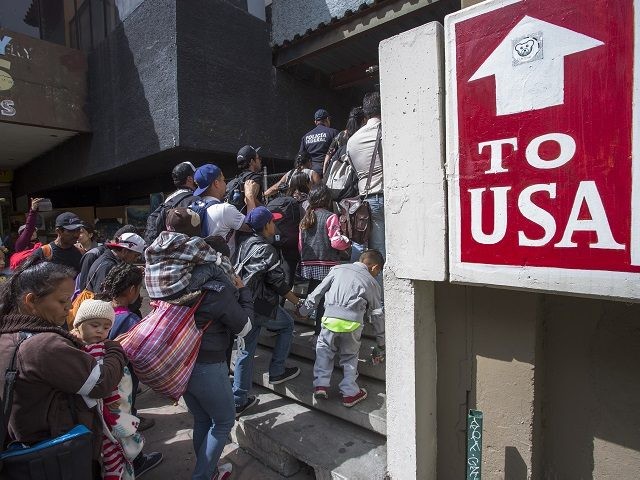Just 1.4 percent of Democrats rate immigration as a top problem for government, even as Mark Zuckerberg’s astroturf empire is still pushing Congress to pass a massive, wealth-shifting amnesty.
Just four out of 285 Democrats polled in August said “immigration” is a top problem, according to an August 24 statement from Gallup.
Forty-one percent of Democrats rated coronavirus as the top problem, 10 percent cited “the government,” 6 percent cited the economy, and 5 percent cited “race relations.”
In contrast, Gallup showed that 23 percent of Republicans offered immigration as the answer to the question, “What do you think is the most important problem facing this country today?”
An August Ipsos poll for Reuters showed that only 5 percent of Democrats and 9 percent of independents described “immigration” as the most important problem facing America. The poll of 1,002 was conducted August 18-19. In contrast, “environment and climate” was picked by 13 percent of Democrats and 9 percent of independents.
Meanwhile, pro-migration advocates are pushing Congress to pass four large amnesties — for at least 8 million people — within the pending budget reconciliation bill.
This push is being led by Mark Zuckerberg’s FWD.us network of coastal investors who stand to gain from more cheap labor, government-aided consumers, and high-occupancy renters.

Facebook CEO Mark Zuckerberg arrives for the 8th annual Breakthrough Prize awards ceremony at NASA Ames Research Center in Mountain View, California on November 3, 2019. (Photo by JOSH EDELSON/AFP via Getty Images)
The investors’ push is filled out by donor-funded, progressive-run groups, such as United We Dream, and is aided by other business groups, such as the American Immigration Lawyers Association.
For example, FWD.us president Todd Schulte tweeted a link to an August 20 article in RollCall.com, touting the use of reconciliation to pass the amnesties via a very narrow majority vote:
Facing the prospect of death by filibuster once again — bills legalizing Dreamers have been filibustered five times in the last 15 years — Democrats have unified around a plan to pass these measures through budget reconciliation. This should not be controversial …
Opponents of the immigration measures, however, are already baldly asserting that such reforms cannot be advanced through reconciliation.
The progressives are touting donor-funded polls that show apparently strong support for amnesties. But the carefully selected questions sideline jobs and wages, play up claimed virtues of migrants, and still get only minority “strong” support for amnesty. For example, in July, the investor-backed Data for Progress group got only 34 percent strong support — and only 14 percent strong opposition — for this skewed question:
Do you support or oppose legislation that would create an earned path to citizenship for undocumented immigrants who were brought to the United States as children, people who are contributing and working here legally due to war or natural disaster in their home countries, and farmworkers and other essential workers? [Emphasis added]
Democrats know their amnesties are unpopular but are counting on passivity by the TV networks and the GOP leadership to reassure Democratic legislators in swing districts. For example, an August-recess memo released by the Democratic Senatorial Campaign Committee completely ignored the pending amnesty, saying:
This research shows that Democrats have an effective message regarding their legislative agenda and accomplishments, including: cutting taxes, growing jobs through investments in infrastructure and lowering health care costs.
In March, Zuckerberg’s group released a polling memo that admitted the public is very uncomfortable about the impact of migration on jobs and amnesty:
It is better to focus on all of the aforementioned sympathetic details of those affected [by an amnesty] than to make economic arguments, including arguments about wages or demand for labor. As we have seen in the past, talking about immigrants doing jobs Americans won’t do is not a helpful frame, and other economic arguments are less effective than what is recommended above.
The FWD.us memo urges Democrats to focus voters’ attention on what they claim are deserving migrants, such as illegals who took Americans’ jobs in economic sectors that are deemed essential:
• Reminding voters of the criteria for citizenship also boosts support and adds to the public’s comfort with granting citizenship. Some of the more popular criteria for citizenship inclusion are being regularly employed and paying taxes, having a spouse or child who has served in the military, living in America for many years, and being in danger upon a return to their home country.
…
• Adapting family separation messaging to the debate over citizenship is our most resonant message. Voters strongly support Biden’s action to end family separation policy at the border, and in testing a variety of messages in support of citizenship, the item below tests best: “It is cruel and wrong to deport people who have family roots in the United States, and work, pay taxes, and contribute to our communities. We must stop separating families and allow hardworking immigrants to gain legal status and a pathway to citizenship so that we keep families together.”
In contrast, a job-centered poll by the Federation for American Immigration Reform produced very different results in June:
Across all 10 battleground states, voter opinion was fairly consistent on key issues related to immigration amidst the current health and economic crises:
By about margins of 2 to 1, voters support “reductions in immigration and guest workers admissions” during the crisis.
Strong majorities of voters in all ten states believe that “limiting admission of new immigrants and guest workers will improve the chances of laid-off American workers being rehired.”
In all ten states, some 75% to 80% of voters believe that it is prudent to “slow the admission of foreign nationals until we can provide thorough health screening to everyone entering the country.”
By majorities of about 2 to 1, voters prioritize reducing overall immigration and strengthening immigration enforcement and border security, over increasing immigration, granting amnesty to illegal aliens, and decriminalizing illegal immigration.
The long-standing federal policy of extraction migration pulls many workers, consumers, and renters from poor countries for use in the U.S. economy. The economic policy inflates the labor supply and boosts consumer spending, so aiding companies and investors.
The migration is deeply unpopular because it damages ordinary Americans’ career opportunities, cuts their wages, raises their rents, curbs their productivity, shrinks their political clout, widens regional wealth gaps, and wrecks their democratic, equality-promoting civic culture.
For many years, a wide variety of pollsters have shown deep and broad opposition to labor migration and the inflow of temporary contract workers into jobs sought by young U.S. graduates.
This opposition is multiracial, cross-sex, non-racist, class-based, bipartisan, rational, persistent, and recognizes the solidarity Americans owe to each other.

COMMENTS
Please let us know if you're having issues with commenting.